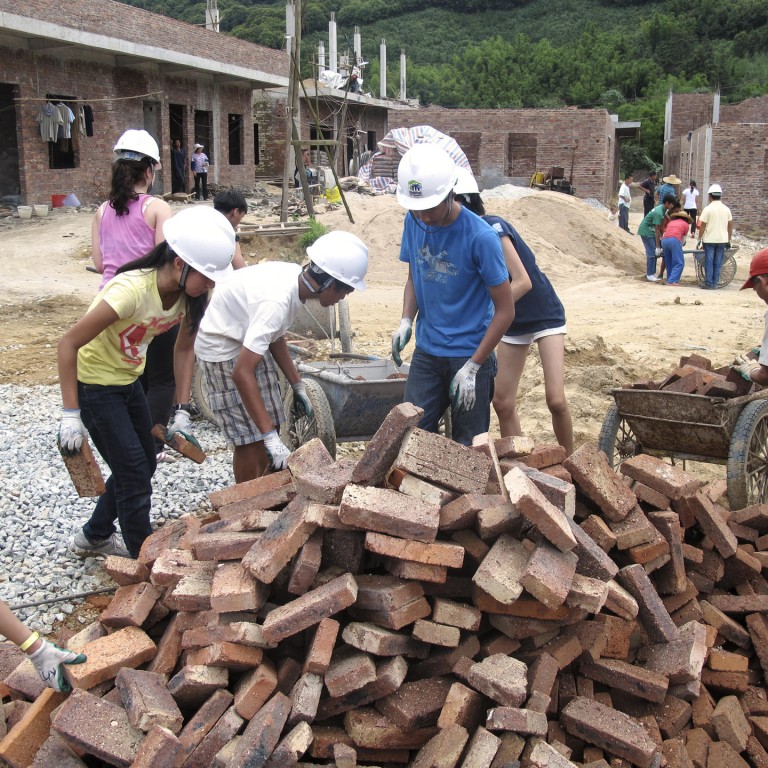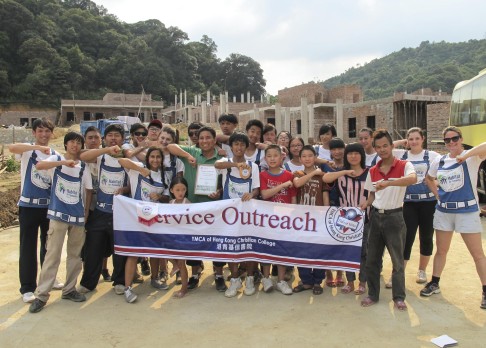
Habitat for Humanity projects in Hong Kong building a better future
A non-profit housing group fosters a positive attitude to life in its student participants
The adage "home is where the heart is" aptly characterises the vision of Habitat for Humanity, the world's largest non-profit housing organisation, founded in 1976 in the US. And Hong Kong's dedicated "Habitat Youth" are learning, as they toil for the less fortunate, that homes and communities are made stronger when love and respect are added to bricks and mortar.
Habitat for Humanity has been active in the Asia-Pacific since 1983, helping more than 1.5 million people achieve the dream of home ownership. Despite its "developed" status, Hong Kong has its share of poverty-related housing issues, giving Habitat's youthful supporters opportunities to make a difference within the territory, across the border and on overseas "builds".
Habitat for Humanity's Hong Kong/China chapter organises several programmes to engage youth directly: project home works, project school works, the global village programme and the habitat youth build. Some recent local projects have included the multi-year restoration of stilt homes and walkways in Tai O, and the campus beautification and greening enhancements to structures and landscaping undertaken at local schools. Several local and international schools have their own Habitat for Humanity school chapters. This is due in part to the growing popularity of service learning as a requirement for graduation. The service-learning ethos is embedded in the "other learning experiences" component of the new senior secondary curriculum as well as in the "creativity, action, service" requirements of the International Baccalaureate Middle Years and Diploma programmes curricula.
Recently, the Independent Schools Foundation Academy in Pok Fu Lam sent 15 students and three teachers to an enhancement project at public housing estates at Long Ping in the New Territories. Students were engaged in painting, plastering and prep work for renovations. Across the border in Guangzhou, 19 students aged 14 to 16 and two teachers from the YMCA of Hong Kong Christian College participated in the "Eliminating the mud houses for low-income rural families" project. Students helped build brick homes and interacted with local villagers.

"Although the everyday work was exhausting, the students overcame difficulties and continued their work with satisfaction and happiness. This helped them develop a positive attitude towards life and towards people in need in other places," says YHKCC teacher and trip supervisor Wallace Lau.
"Also, they learned how to be independent … as there was no parental support throughout the trip, and they felt themselves growing much more after just one week of service."
Students at the Canadian International School of Hong Kong (CDNIS) are also adding the craft of bricklaying to their skill set. The CDNIS community recently celebrated five years of Habitat for Humanity involvement, undertaking one build in China and another in international destinations such as Cambodia and Thailand each year. Fundraising makes these trips possible, and the secondary students who participate are proud to be "bankrolled", at least in part, by their little counterparts in the primary school.
This service allows us to recognise the issues and find solutions
Last autumn, CDNIS primary students participated in a "Paint Your Key" fundraiser organised by the Habitat club executive, raising HK$30,000 on the day.
Agnes K.Y. Tai, chief executive officer of Habitat for Humanity Hong Kong, praises the work of the Hong Kong students.
"They join our builds overseas and then share with fellow students when they return. For example, the campus chapter set up by the Canadian International School for Habitat in Hong Kong do monthly sharing about the work of Habitat, through games or Facebook to create awareness of poverty and housing."
Tai says that the Habitat outreach staff reciprocate by providing workshops for the students whenever the opportunity arises "so that the spirit of Habitat will also impact their lives".
CDNIS student Ashley Zee has been on many builds, and recounts the happiness of the new homeowners as the highlight of her trip: "The homeowners were excited to move into a proper, decent house with concrete walls and a stable roof above their heads. It was truly an emotional and wonderful experience as much for ourselves as the homeowners … It was a wake-up call for me to really appreciate what we have living in an MEDC [more economically developed country]. A big thank you to the skilled workers on the site who taught us how to correctly lay bricks …"
As students' reflections show, there are many benefits to service learning. Joyce Chau, in Grade 12 and executive officer of the CDNIS Habitat For Humanity Club, as well as 2012 China trip participant, says the opportunity to witness and experience first hand the conditions the families live in is instructive.
"Going on these trips is an extremely valuable experience because it helps us understand, and serves as a reminder, that perhaps the so-called cliché stories and pictures of those without a proper home to live in we often overlook are not so clichéd, and that they are people who need support from those who can offer it. The importance of this issue can be difficult to fully grasp until we see it for ourselves."
Ryan Wong, a Grade 11 student and a 2014 Thailand trip participant, agrees. "Having a commitment to doing service initiatives allows us to connect and collaborate with the rest of the world, whether in the local community or with people from around the world. Service learning allows us to recognise the issues that exist around us, and find solutions to those problems."
The 2015 Habitat for Humanity Youth Build will take place at Conghua City, Guangdong province in March. Tasks will include building homes or public facilities (including digging and laying bricks). Students aged 15 or above may enrol for a minimum donation of HK$3,500. The enrolment deadline is February 27, 2015.
For more information about build trips or starting a campus chapter contact [email protected].
